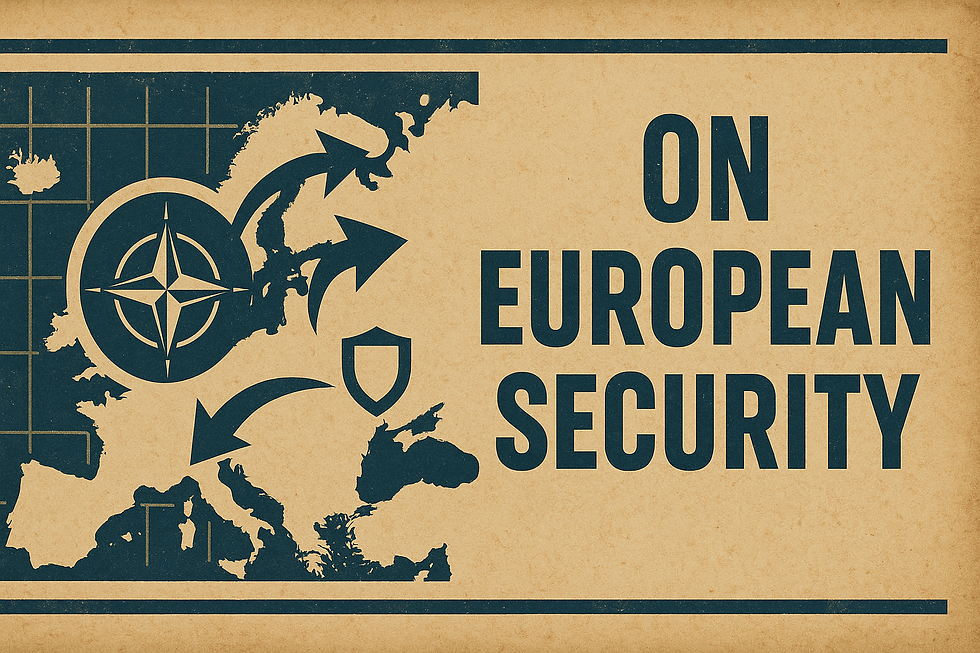On European Security: NATO’s Missing Authoritative Frame
- john raymond
- Aug 10
- 4 min read

NATO-Europe Must Relocate Its Operational Brain to Kyiv
For three generations the alliance outsourced strategic cognition to the Pentagon; that habit now collides with internal sabotage risk and a U.S. executive whose incentives diverge from European security. The only actor with the clarity, competence, and skin in the game to anchor Europe’s deterrent against autocratic expansion is Ukraine.
Coordination with Kyiv must cease to be “support” and become the organizing principle of European defense.
The Diagnosis Is Straightforward
A Pentagon-centric alliance functions only when Washington is both reliable and aligned. When it is not—whether through ambivalence, delay, or deliberate narrative manipulation—Europe’s decision-loop stalls.
Pillar One of the Raymond Method—Regime Security—imposes a ruthless lens: Putin’s war is a survival project for his regime, and any Western hesitation is harvested as operational space.
Pillar Two—Asymmetric Warfare—explains the means: energy leverage, lawfare, information operations, and industrial intimidation that punish every European pause.
Pillar Three—the Byzantine Traitor-General—poses the design question NATO has refused to answer: What if a pivotal insider predictably defects or self-deters at the decisive moment? If your architecture assumes U.S. concurrence for every material escalation, you have engineered a single point of failure.
Kyiv is the corrective because it is the only capital that meets all three tests simultaneously: intent clarity, feedback speed, and proven reliability under existential pressure.
Intent clarity matters first. Ukraine’s strategic assessment of Kremlin goals is unconfused: conquest is iterative, “ceasefires” are weaponized, and territorial concessions are staging grounds for the next attack. This baseline eliminates the euphemisms and wishful framing that have repeatedly paralyzed European policy.
Feedback speed is second. Ukrainian command works inside Russia’s adaptation cycle, iterating tactics on a weekly cadence across air defense, electronic warfare, deep-strike targeting, and maritime denial. Tempo is not a talking point; it is the difference between a defense that learns and a defense that briefs.
Proven reliability is third. Kyiv has executed under bombardment, reconstituted after shocks, policed corruption that threatened operational security, and continued to deliver combat results while many Western capitals debated vocabulary.
Reliability under fire is the only credible metric in a regime-security contest.
Reorganization Follows from the Diagnosis
Europe must build a permanent NATO–Kyiv joint brain, not a liaison. Establish a European-led, Kyiv-centric Joint Strategic Cell with co-located nodes in Warsaw and Ramstein to fuse targeting priorities, air-defense laydowns, EW doctrine, and munitions flow.
Stop treating Ukrainian requirements as external demands to be adjudicated in Brussels; treat them as primary inputs that set the default.
European enablers—ISR constellations, tanker lift, long-range fires, integrated air and missile defense—must be sized and scheduled against Ukrainian operational timelines, not against domestic press cycles.
Lift ad hoc strike vetoes and replace them with pre-committed trigger logic: when Russia escalates along defined thresholds, preauthorized capabilities unlock without a fresh political debate Washington can stall.
Industrial Policy Must Move Under Kyiv’s Operational Grammar
Ammunition, SAM interceptors, loitering munitions, and engine spares need to be contracted, sequenced, and delivered to match Ukrainian kill-chain demands rather than national optics. That means enforceable performance contracts with penalties for delay and a munitions board where Ukrainian officers hold voting parity on prioritization.
Europe’s maritime and energy posture should key off the same brain: sanctions design, maritime insurance, port inspections, and sea-lane interdiction must be synchronized with Ukrainian deep-strike and blockade operations to compress Russia’s adaptation options.
Information policy must be recentered as well: the alliance narrative should flow from Kyiv’s ground truth, not from a White House comms cycle that may be advancing a theatrical “peace” fiction.
Legal and Political Engineering Are Tractable
Article 5 is not the obstacle; imagination is. A coalition-within-the-alliance can operationalize this shift today: a Berlin-Paris-Warsaw-London compact that recognizes Kyiv as Operational Partner-Prime, delegates planning authorities into the joint cell, and commits defined capabilities to the cell’s schedules.
EU instruments can underwrite contracts; NATO structures can host; national parliaments can mandate automaticity for predefined contingencies.
The United States can remains a partner of consequence, but it cannot be a brain vetoing Europe’s reflexes.
Risks Are Real and Manageable
Russian escalation must be priced into the plan rather than feared into paralysis; a betrayal-tolerant design assumes spikes in missile salvos, grid attacks, and sabotage and answers them with preloaded responses that do not wait for transatlantic mood swings.
Espionage risk in a Kyiv-centric hub demands ruthless compartmentalization and counterintelligence; that is a reason for better design, not for distance.
Supply-chain stress argues for redundancy and stockpiles, not for drift.
The Implications Are Decisive
If Europe anchors its strategy in Kyiv, the alliance acquires an authoritative frame that cannot be theatrically rewritten by an American executive aligned with adversary interests.
Deterrence stops being a press release and becomes a machine: inputs from the front produce outputs in procurement, posture, and policy on schedules the Kremlin cannot stall.
If Europe refuses this re-centering, it will continue to outsource its survival to a variable partner and watch Putin arbitrage every delay.
The strategic truth is blunt: only Kyiv has earned the authority to set the frame because only Kyiv has paid the price to see the war clearly.
Organize Europe around that fact, or continue pretending that a borrowed brain will save you from a patient enemy.






Comments